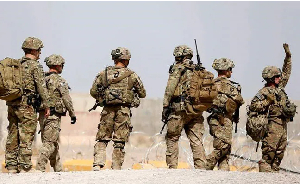- Home - News
- TWI News | TV
- Polls
- Year In Review
- News Archive
- Crime & Punishment
- Politics
- Regional
- Editorial
- Health
- Ghanaians Abroad
- Tabloid
- Africa
- Religion
- Election 2020
- Coronavirus
- News Videos | TV
- Photo Archives
- News Headlines
- Press Release
General News of Wednesday, 23 September 2009
Source: GNA
"Stand Up" Against Poverty campaign launched
Accra, Sept. 23, GNA - Mr Anthony Amuzu, Head of Data Management and Analysis at the Ghana Statistical Service, on Wednesday noted that even though the past 15 years had seen some decline in the level of poverty in Ghana, some areas still showed high levels of poverty. He said the Rural Savannah and Rural Forest areas still had very high proportions of their population living in extreme poverty. Mr Amuzu said this at the launch of the 2009 "Stand up Take Action against Poverty" campaign organized by the Christian Council of Ghana and its stakeholders to remind African governments of their commitments to the eight pillars of the Millennium Development Goals (MDGs.) In the year 2000, leaders of 189 countries, including Ghana, signed the Millennium Declaration and agreed to do everything in their powers to end poverty by achieving the MDGs, a roadmap to end extreme poverty by 2015.
The eight pillars were the eradication of extreme hunger and poverty; achieving universal primary education; promoting gender equality and empowerment of women; reducing child mortality; improving maternal health; combating HIV/AIDS, malaria, and other diseases; ensuring environmental sustainability, and developing a global partnership for development.
Mr Amuzu said poverty among food crop farmers also remained high, and stressed the need to intervene in those areas if Ghana was to reduce poverty significantly to meet one of the goals of the MDGs. He said interventions such as the modernization of agriculture as enshrined in the National Development Plan, must be vigorously pursued to reduce poverty among those population groups and subsequently, the country as a whole.
He said in relation to goal one of the MDGs, it appeared that Ghana might be able to achieve the goal of halving the rate of poverty between 1990 and 2015, if the economy continued to experience the high growth rate recorded earlier.
Mr Amuzu said using the upper poverty line of GHC370.90, the proportion of the Ghanaian population defined as poor fell from 51.7 per cent in 1991/1992 to 39.5 per cent in 1998/1999 and further to 28.5 per cent in 2005/2006.
In a statement read on her behalf, Ms Sena Akua Dansua, Minister for Women and Children's Affairs, said economic empowerment of women was crucial for ending poverty.
She said countries could speed up their economic growth only if they could harness the potentials of women.
Ms Dansua said her Ministry was very particular about the plights of women and children and had been assisting women with credit facilities as well as business and financial management training workshops to equip them with the necessary tools to enhance themselves. She said most of the Ministry's activities were geared towards rural areas where poverty had gained roots, and urged all to join the crusade to fight hunger and poverty in the country.
Mr Kofi Asamoah, Secretary-General of the Ghana Trades Union Congress GTUC), in a speech read for him, said a lot had been said and written about how to make poverty history.
He said "The only way the poor can participate in the growth generating process is relying on the abundant resources of the poor, which is their labour," he said.
Mr Asamoah said the country's current growth process was unplanned, was based on the resources of a few rich and relied heavily on the devices of free market for the distribution of the benefits of growth.
He therefore advocated for employment-centred growth, which he said was the only sustainable way to end poverty.
The Reverend Dr Fred Deegbe, General Secretary of the Christian Council of Ghana, said Stand Up, Take Action was a world wide call to join the global movement against poverty and demanded that governments work harder to meet the MDGs deadline by the 2015.
He said there were many inequalities in the world but God had provided everything one needed to address them.
Ms Adjoa Kluvitse, Country Director of ActionAid, Ghana, pledged her NGO's support for the crusade, adding that areas such as child mortality and child health needed more attention. 23 Sept. 09




![Construction has stalled on the National Cathedral [Image Credit: Nipah Dennis/Al Jazeera] Construction has stalled on the National Cathedral [Image Credit: Nipah Dennis/Al Jazeera]](https://cdn.ghanaweb.com/imagelib/pics/588/58802743.295.jpg)





